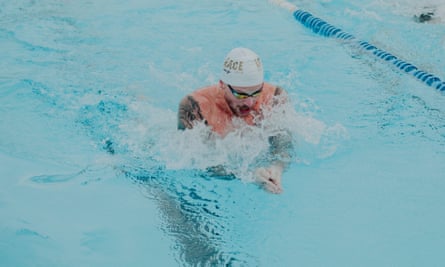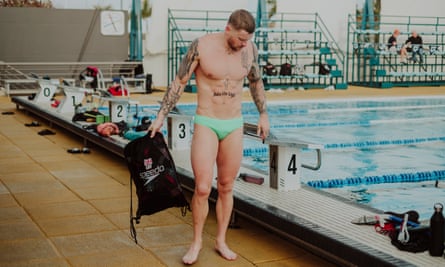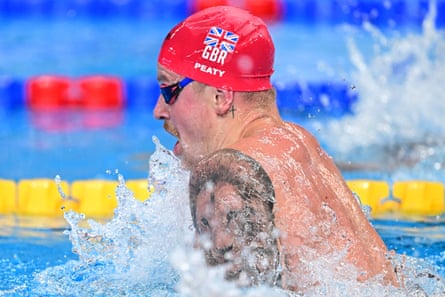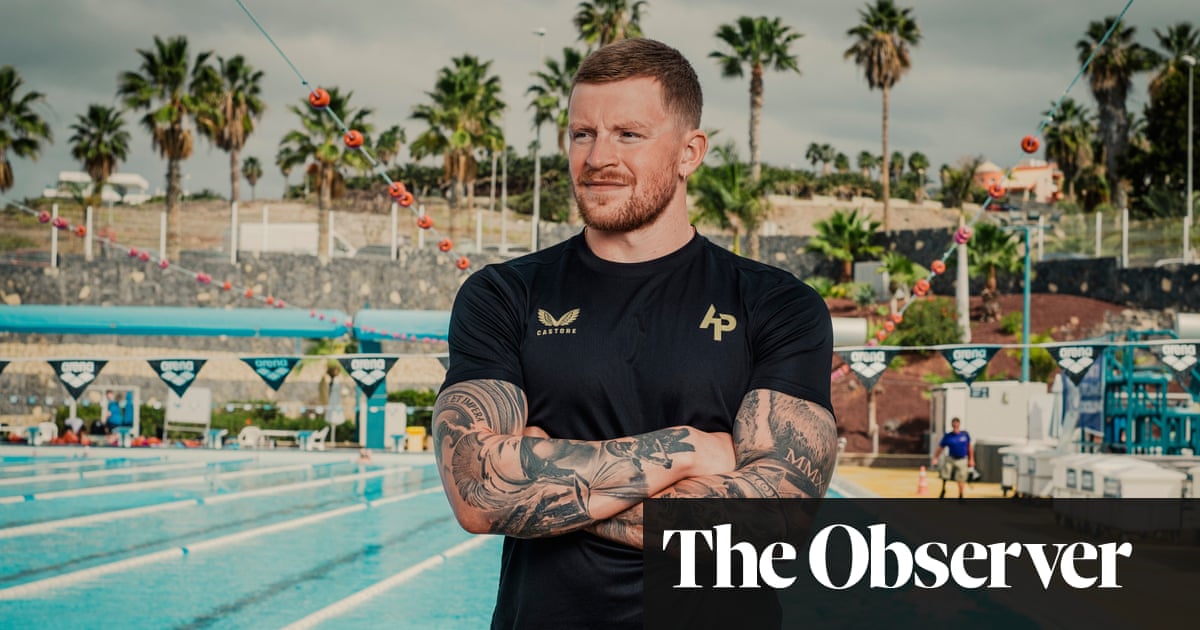Adam Peaty looks like a lonely gladiator on the block as, seeing me arrive at his training camp in Tenerife just after seven on a Wednesday morning, he raises his right arm in silent greeting. Work has already begun in the watery sunshine and another four hours will pass before Peaty opens up about coming back from a breakdown just over a year ago.
Peaty wears his goggles and a white cap and, seconds later, plunges into the pool to start training as he aims to become the second male swimmer in Olympic history, after Michael Phelps, to win a third successive gold medal in the same discipline. For Peaty this is the 100m breaststroke, an event in which he remained unbeaten for eight years until his shock loss at the Commonwealth Games in 2022.
There was a time when Peaty had swum the 20 fastest times in the discipline and, even now, four months from the Paris Olympics, his world record 56.88sec is clearly superior to the 57.69 of his closest rival, Qin Haiyang of China. But, on the comeback trail, Peaty had to settle for bronze in the world championships last month.
During an “easy” two-hour slog through the water, swimming freestyle before switching to leisurely, and then quicker, lengths of his chosen stroke, it is hard not to wonder what might still be churning inside the double Olympic champion. He has faced down depression and re-emerged with a delicately calibrated physical, psychological and spiritual equilibrium.
The words Into the Light, beneath a cross, are tattooed into his torso and after the pool Peaty leads me to an open-air gym where he pummels his body into racing shape for another hour. And then Peaty confronts the darkness of his recent past during a gripping interview.
“It started in the water and my goggles filled with tears,” he says of his breakdown in a pool in Loughborough in February 2023. “I was crying as I was swimming and I couldn’t acknowledge the situation without crying for months because it had broken me. Remember how Bane breaks Batman’s back? That’s what I did to myself mentally. I lost all sense of direction and purpose. I thought: ‘Why am I even here?’”
 View image in fullscreen
View image in fullscreen
We have found some shade and Peaty removes his dark glasses. He remembers climbing out of the pool and approaching his longtime coach, Mel Marshall, one of the most admirable women in sport. “I said: ‘Mel, I’ve got to get out.’ I’d never terminated a training session before. I’d always gone: ‘Can I have more, can I have more?’ Like a labrador with a stick.
“I was in the shower, still crying, and Mel said: ‘What’s up?’ I told her: ‘I’m done.’ Until then I’d ignored everything about that burnout. I did 25m breaststroke and I was like: ‘I don’t want to do this any more.’ I couldn’t think of anything worse and that thought had been brewing for months, potentially years. It was no longer worth it.
“I went to the shop, bought loads of chocolate and ate it. It’s what you call a breakdown because I lost all discipline, confidence and purpose. The greatest achievements are not easy and I just wasn’t willing to pay that cost any more.”
Did he feel scared? “I’m not scared of not being identified as an athlete. I’m really looking forward to that after swimming. But then I understood I wanted to make sure I ended the sport on a good note instead of a breakdown in a shower over a 25m breaststroke.”
Peaty used to feel “like a god” before races but that fleeting sensation was built on a consuming obsession to be the best. Even another world record, or gold medal, was never enough. In the Tenerife gym we have just left, he broke his foot a few months before the 2022 Commonwealth Games and his painful first 100m defeat since 2014. He finished an unthinkable fourth after returning to the pool too soon. The psychological cracks soon widened.
A gold doesn’t fix relationships you destroy because of the selfishness you have to have and how hard you have to work
“The spiral of destruction is just a human trait,” he says. “When you’re not happy with something, you want to destroy it. People with drug and alcohol addiction are trying to numb or hide from themselves. We live in a very painful world but, in terms of my experience, this spiral of destruction came because I’d been swimming for so long and I’d achieved all I wanted. I’d hit every goal but it kept moving higher and higher.
“So I started drinking. I was trying to drink enough to be numb and then wake up the next day and go again. Everything was colourless. Even if the flowers were red, in my brain they were grey.
“It’s hard to explain but, because our bodies [as Olympians] are pushed into places of constant attrition, it’s like being under siege and I wasn’t in a stable relationship.”
Peaty was in a bad way but he “dragged myself out of it”. With the help of different people he began to rebuild himself. A turning point came when he met Holly Ramsey, whose father is Gordon Ramsey, and their relationship seems rooted in meaningful privacy rather than celebrity. “She gives me peace and that brings so much stability. We met last summer and, whatever happens in the pool, I’m still winning because I’ve found the right person.”
 View image in fullscreen
View image in fullscreen
Having felt spiritually empty for so long he owes much to Ashley Null, an academic and theologian who worked as a chaplain to the GB Olympic team. “Ashley has been very important as he brings a different perspective. He says the coldest thing you’ll ever wear is a gold medal. On the podium you think: ‘Yeah, this is all worth it.’ But it doesn’t solve any of your issues. That gold medal doesn’t fix the relationships you destroy because of the selfishness you have to have and how hard you have to work.
“A big moment came when I went to church with Ashley and we sat at the back. It made me understand people are more lost than ever as it takes huge wisdom to feel grateful for what we have. We’re programmed to always want more. The hardest thing is to put your pride aside and say: ‘It doesn’t matter what you earn or what you’ve accomplished.’ We should all be equal. But I never push [his faith] on people.”
Peaty has also been helped by Steve Peters, the psychiatrist who has worked with many sporting figures, including Ronnie O’Sullivan and Victoria Pendleton. “I see it as a triangle. You have spiritual, physical and psychological capabilities. To really succeed in life all of those need to be strong as they rely on each other.”
skip past newsletter promotionSign up to The Recap
The best of our sports journalism from the past seven days and a heads-up on the weekend’s action
after newsletter promotion
His confidence took “a little hit” at last month’s world championships in Doha when he finished third even though Qin, the favourite for gold in Paris, skipped the event. But Peters helped him and the 29-year-old says: “In Doha, I was coming off an extremely hard training camp. I was happy with the result in the semi but in the final I lost a bit tactically, which was just a lack of recent racing experience. For two days I was like: ‘Oh, this is a bit rubbish. I don’t feel I got what I deserve.’”
 View image in fullscreen
View image in fullscreen
He laughs. “No one ever feels they got what they deserve in sport. But I turned it around because I know how important it is to keep being resilient and disciplined. At the same time, be relaxed. Find some joy in it.”
Peaty looks at me intently. “Don’t get me wrong, I’m still going to fight like a dog. That time is nearing and incredible people like Steve help me turn on certain things I need [to win].”
The newly philosophical Olympic champion insists he retains the searing competitiveness that defined him for so long. “You need it in the pool. Anyone that says you don’t is lying. It’s one of our instincts to think we’re the best and to prove it.”
Does he think about Qin, who beat him in the World Cup last October? “You think about him in the pool and the gym. I’m sure he thinks about me. But the healthiest way to be competitive is to show huge respect. I know how hard it is to do what he’s doing. So have respect but, as soon as I’m in the pool, be an enemy.”
Qin’s best time is still some way off Peaty’s world record. “It is,” Peaty says, before smiling wryly. “But I need to find my way back to my best time. I’m catching him but will we get him in time? I joke about it now whereas before it would be very serious. Your stroke becomes stiff and tense but I’m now trying to let everything flow.”
In the worlds he was beaten by Nic Fink of the United States, who swam 58.57, and Italy’s Nicolò Martinenghi in 58.84. Normally, Peaty would expect to beat them both. “I’ve swum 56 [seconds] and I’m at least a low 57 swimmer. We went into this worlds two days before we started. Normally it’s two weeks to prepare but we flew in with no rest. But they’re great competitors and I’m looking forward to a nice battle at the Olympics.”
 View image in fullscreen
View image in fullscreen
Peaty has spoken of waging “a vendetta” against himself. “I mean that I want to burn that old me outside the pool when I was not very nice. There’s a better version of me. But you still need that relentless attitude, which I save for special days. I need that beast then. But every other day I want to get better physically, psychologically and spiritually.”
Does he believe he can make history by matching Phelps with a third successive Olympic gold medal? “I wouldn’t be here if I didn’t. There’s no room for thinking: ‘Oh, I’m only doing this for second place.’ I’m here to get the best out of myself. If that equals gold, I’ve done both. If it doesn’t, then I gave it the best I could.”
Early that morning, Marshall had told me that, after guiding him to Olympic gold in 2016 and 2021, this was by far the most interesting challenge. “This third Olympic cycle is incredibly different,” Peaty says. “I am being tested in every way. I haven’t had the satisfaction of easy wins, or any wins, really. But I expect to stand behind the block in Paris and go: ‘I couldn’t have done anything better, I’m grateful for this gift, I’m grateful for this opportunity.’
“It’s a perfect balance of gratitude, perspective and bringing in a little dominant assertion. I am the best, I can be the best and I perform when it matters.”
Peaty looks thoughtful. “I know what we do is very different to what 99.9% of people experience. But if anyone is reading this, and they’re breaking down in their own lives, there’s so much they can do to reverse that. The devil may be on your shoulder but you must turn the ship.
“One of my favourite quotes is that ships are always safe in harbour but it’s not what ships are for. We have to sail out and brave the waves, storms and hurricanes to get to the other side.”
∎